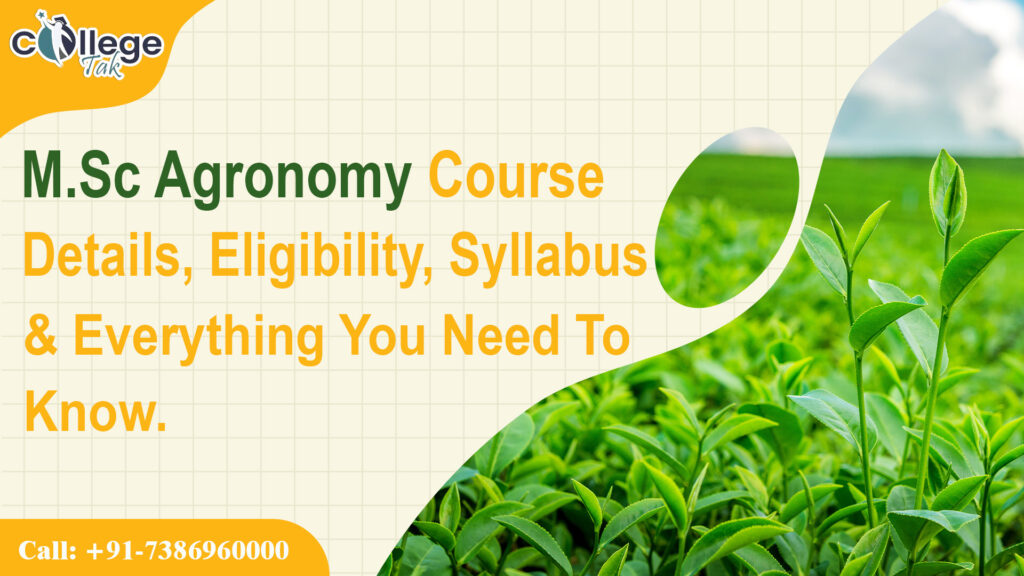About M.Sc Agronomy
M.sc Agronomy is a 2-year postgraduate program, divided into 4 semesters, every semester lasting 6 months. The course is designed to offer training to eligible candidates on the ways to improve agricultural productivity, and assist societies with the ability to streamline more efficient food production methodologies and food security.
Eligibility Criteria for M.sc Agronomy
Aspiring M.Sc. agronomy applicants must have received a minimum score of 50–55% on the B.Sc. (Ag.) from an equivalent qualifying test that the university has approved.
Benefits of (M.Sc.) Agronomy
After completing M.sc agronomy candidates may opt for the opportunity in applied research and product development in the business sector, government organizations, or in fundamental research institutions.
Candidates can also serve as agricultural scientists, private clients, and the government and advisers to businesses. Students can pursue their further teaching and research studies after completing the Master’s program. Students can also work as junior fellow researchers to grow their knowledge and work experience at the Indian Agricultural Research Institute (IARI) in Delhi. Completing a master’s degree in agronomy can help students directly by fostering the acquisition of valuable skills in various jobs in government and private sectors.
Admission Procedure for M.Sc Agronomy
- Candidates must have score minimum of 55% score in their graduation degree.
- Some universities and colleges take admission through entrance tests and their merit base.
- Candidates must have to check the eligibility criteria set by the university or college.
- Candidates must be required to complete the application form of the university or college they are interested in.
It’s important to note that the admission process may vary from university and college and can vary by state. It is suggested to check the proper admission requirements and procedures of the college or university to which you are interested in applying. The last check is the availability of seats and competition can also help with how to prepare.
M.Sc Agronomy Course Details
| Degree Name | Master of Science in Agronomy |
| Degree Level | Post-graduate |
| Entrance exam | CUET, AGRICET,MCAER PG CET,ICAR AIEEA. |
| Eligibility Criteria | If the student has completed his/her B.Sc Agriculture or relevant course with 50% aggregate marks, the candidate is eligible to proceed with the PG course. |
| Course Duration | 2 years |
| Exam Type | Semester |
| Education Mode | Regular |
| Course Fees | 80000 INR to 100000 INR per Annum |
| Selection Procedure | Entrance Exam/ Merit- based |
| Average Salary | 3-4 LPA |
| Top Recruiters | Agrocel Industries Ltd, AMUL, EID Parry India Ltd, Nagarjuna Agrichem Ltd, Rallis India Coromandel International, Monsanto India, Nestle India, Bayer Crop Science, etc. |
| Job Profiles | Agriculture Manager, Research Scientist, Agricultural Scientist, Food Inspector, Farm Manager, etc. |
M.Sc Agronomy Syllabus
Syllabus of 1st Year M.Sc Agronomy Course
| SEMESTER I | SEMESTER II |
| Principles and Practices of Soil Fertility and Nutrient Management | Modern Concepts in Crop Production |
| Principles and Practices of Water Management | Plant Genetic Resources and Seed Technology |
Syllabus of 2nd Year M.Sc Agronomy Course
| SEMESTER III | SEMESTER IV |
| Agronomy of Fodder And Forage Crops | Practical Training |
| Agronomy of Major Cereals and Pulse | Agri Marketing Basics |
M.Sc Agronomy Scope, Carrier, and Job Profile
There is a huge career scope in the field of MSc Agriculture. Students can grow their careers in both government and the private sectors. A graduation degree in agriculture is tremendously valuable. If students want to increase their knowledge in the field of M.sc Agriculture, the opportunities become much better. After pursuing M.sc Agriculture the opportunities in private companies are pleasing too. After completing the course, students can easily get different renowned plantations in management posts. The candidates can also enjoy the job at the fertiliser manufacturers and firms. Candidates can apply for a lectureship in a private organisation.
| Job Profile | Job Description | Approx. Salary |
| Research Scientist | Through their activities, research experts investigate cutting-edge methods to raise the standard of food produced and delivered. | INR7- 8 LPA |
| Farm Manager | Farm managers are in charge of setting up sales and purchases of livestock, farm equipment, crops, and agricultural products in addition to creating budgets and keeping proper financial records. They maintain administrative records and handle paperwork. They hire, educate, train, and manage farm laborers. On farms, crops can include cereals, oilseeds, vegetables, and salad, while livestock is typically comprised of pigs, cows, or sheep. Planning methods for optimal produce, organizing farm administration, operating machinery, organizing related businesses, and managing people are just a few of the varied tasks involved in the position. | 1-2 LPA |
| Subject Matter Specialist- Agronomy | Subject Matter Experts in Agronomy: They teach beekeeping, mushroom cultivation, rodent decomposition, biogas unit production, and new technology demonstrations for increasing agricultural output. For instance, farmers can boost the pace of seed replacement by producing more seeds. | INR 2-3 LPA |
| Agronomist | Agronomists also referred to as crop scientists, are experts in growing and enhancing food crops through research and the creation of production techniques. Agronomists spend half of their time in the lab and in the field. While in the field, they gather samples, converse with farmers and other industry participants, or present various methods and products that have the potential to enhance soil quality. | INR 5 LPA |
| Lecturer | Undergraduate and graduate students are taught academic and vocational subjects by lecturers. They work in academic institutions and do their research to advance the overall research initiatives of their division or organization. | INR 3-4 LPA |






